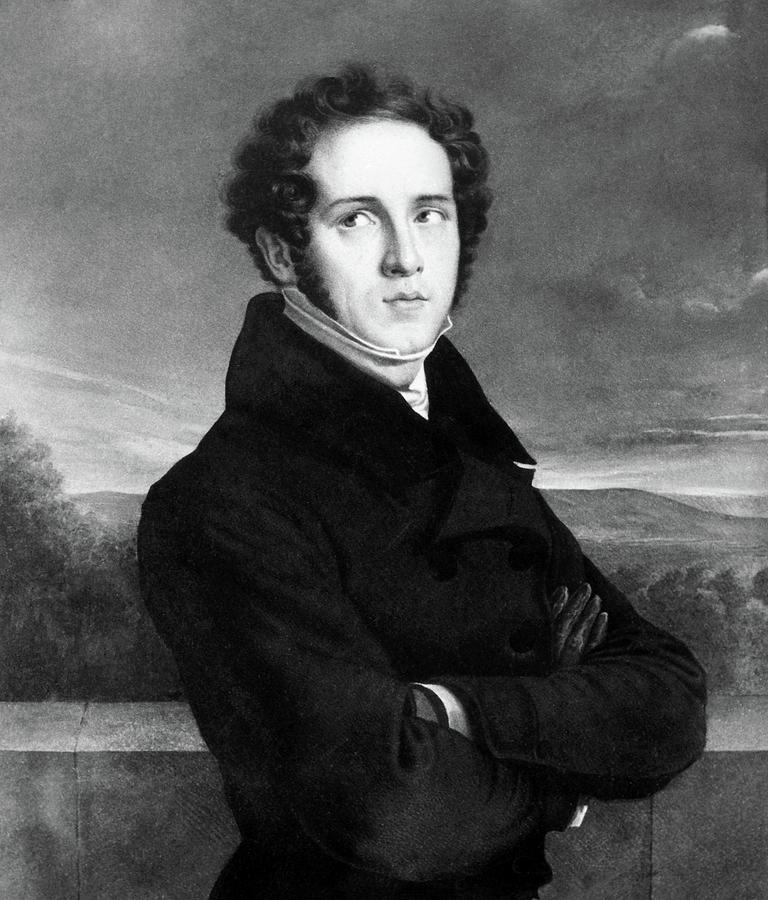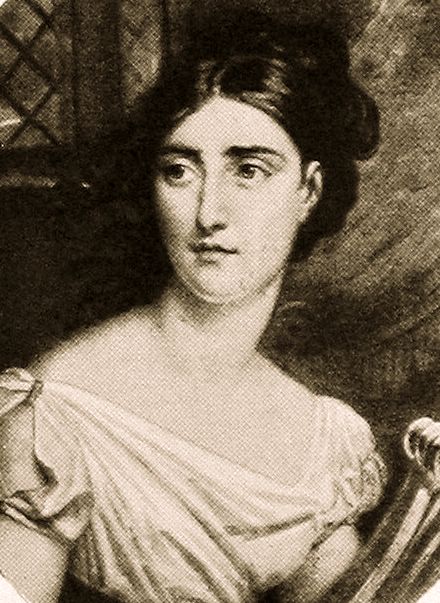Bel Canto & Bellini
Vincenzo Bellini's vocal writing epitomises the Italian Bel Canto ('beautiful singing') school of singing. The term describes the style of singing which embodies beauty and evenness of tone, smooth legato phrasing and perfection of technique.
 |
| Vincenzo Bellini (1801-35), painting by Granger. Image source |
Bellini was born on 3 November 1801 in Catania, Sicily. He came from a family of musicians (both his father and grandfather were organists of Catania Cathedral and maestri di cappella), but a musical career was heavily opposed. Such was Bellini's ability, though, that friends of the family exerted pressure on his father to relent, and when the duke and duchess of San Martina offered to fund the young Bellini's studies at the Real Collegio di Musica di San Sebastiano in Naples, his father finally gave in.
Bellini was a diligent student, writing several sinfonias, masses, a cantata and his first opera. The opera was produced at the Conservatorium with such success that the San Carlo Opera of Naples commissioned him to write another one. One commission led to another, including one from Italy's most prestigious house, La Scala. In April 1827, Bellini left Naples to live in Milan. Working with the experienced librettist Felice Romani, he wrote the work that secured his reputation internationally - Il Pirata (The Pirate). Though popular with the public, Bellini's vocal writing was not immediately appreciated by all who sang his works - the singers were used to more showy, athletic arias. Adelaide Tosi, demanded that Bellini give her something more demanding to wow the audience. However, Bellini refused, insisting that the music be sung as written.
"Opera must make people weep, feel horrified, die through singing."
- Vincenzo Bellini
In 1828 Bellini fell in love with Giuditta Turina, the daughter of a wealthy silk merchant. She was beautiful, adoring, rich, but married. The affair, which was tolerated by Giuditta's husband as long as it remained discreet, lasted five years and, in Bellini's words, 'protected [him] from marriage'.
1831 saw the premiere of his seventh opera La Sonnambula (The Sleepwalker).
DHM YouTube Playlist - Maria Callas sings Amina
This was exceptionally well-received, with the role of Amina sung for the very first time by the great coloratura soprano, Giuditta Pasta.
"Pasta and Rubini sang with the most evident enthusiasm to support their favourite composer. In the second act the singers themselves wept, and carried their audience along with them, so that...tears were continually being wiped away in boxes and stalls alike. Embracing Shterich in the Ambassador's box, I too shed tears of emotion and ecstasy."
- The Russian composer Glinka after the first night of La Sonnambula
 |
| Giuditta Pasta, Image source |
 |
| Giuditta Pasta as Amina, May 1831 premiere. Image source |
 |
| Image source |
By the time La Sonnambula was complete, Bellini's was no longer seeing Giuditta Turina and he was contemplating marriage with Clelia Pasta, the 13-year-old daughter of his inspiring leading soprano. In 1834, when Clelia was 16 (and he 33), he approached the Pastas to ask for her hand in marriage. The refusal was 'most polite but icy', and she was married off to one of her cousins soon afterwards. Despite affairs with other women, two proposals of marriage and three other prospective partners, none of whom could provide the minimum dowry of 200,000 francs he demanded, Bellini never married.
La Sonnambula was followed by one of Bellini's most well-known operas, Norma. The title role is an Everest of the soprano's repertoire: immensely long and vocally taxing. One famous Norma, Lilli Lehmann (1848 - 1929), said she would rather sing three Brünnhildes (Wagner) than one Norma.
Listen to 'Casta Diva' ('Chaste Goddess'), one of the most popular of all soprano operatic arias:
The first night at La Scala of Norma was a total disaster - Bellini was in tears after the performance. However, soon after, it quickly established itself for what it was:
"A great score that speaks from the heart...A work of genius"
- Richard Wagner
After a premiere in Venice in 1833 of mediocre success, Bellini set off for London and then Paris, where he remained for the last two years of his life. There he befriended Rossini and Chopin. A few weeks short of his 34th birthday, he was stricken with a fatal inflammation of the large intestine. He died at the home of an English friend, on the outskirts of Paris on 23 September. Bellini was buried in the cemetery of Pere Lachaise, but in 1876 his remains were removed to the cathedral of Catania, where his father and grandfather had once played the organ.
Bellini once made a prescient remark to a friend after listening to Pergolesi's Stabat Mater:
"If I could write one melody as beautiful as this, I would not mind dying young like Pergolesi."
- Vincenzo Bellini
This blog is intended to be educational and to share knowledge about music. Daily Hit of Music does not claim to own anything contained in this post and declares its sources openly. The following sources were used for this blog post: Jeremy Nicholas 'The Great Composers', Wikipedia.
Image sources can be found in the image captions.
Recordings can be found on YouTube by clicking the 'DHM YouTube Playlist' links.
Comments
Post a Comment